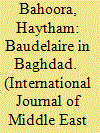| Srl | Item |
| 1 |
ID:
125991


|
|
|
|
|
| Publication |
2013.
|
| Summary/Abstract |
During a revolutionary period of cultural production and anticolonial political commitment in 1950s Baghdad, the modernist poet Husayn Mardan was put on trial for his "obscene" collection entitled Qasa?id ?Ariya (Naked Poems). Heavily influenced by Baudelaire, Mardan's poetics provide a revolutionary paradigm focused on the gratification of the corporeal. This paper considers how Mardan's poetry, largely marginalized from the canonized modernist Arabic poetic tradition, registers resistance to an increasingly rationalized and bureaucratic social order through a transgressive poetics that displace the political onto the body. Lampooning social uprightness and middle-class sterility, Mardan's poems encourage sexual licentiousness, embrace the space of the brothel, and celebrate filth and germs. Through a consideration of Mardan's appropriation of Baudelaire, this essay theorizes the translation and transformation of Baudelaire's paradigmatic literary representations of modernity into the context of a modernizing Baghdad and therefore historicizes the appearance of modernist aesthetics in a non-European space.
|
|
|
|
|
|
|
|
|
|
|
|
|
|
|
|
| 2 |
ID:
118919


|
|
|
|
|
| Publication |
2013.
|
| Summary/Abstract |
This paper adds to a relatively new line of research investigating inadvertent transformations of urban colonial space generated by collective trauma. To the now classic iterative, and racial dynamics of Neild's 'accommodation' in the development of Madras,1 and of Yeoh's 'contesting' of the built environment in Singapore2-specifically in the tugging and pulling between local and colonial influences within the spatial discourse of colonial port cities-needs to be added that of single or multiple-event collective trauma. Such trauma, perceived as brought upon by unexpected external causes, might consolidate, perhaps accelerate, or even sever a previous sequence of spatial negotiation, particularly if that sequence was politically vulnerable or immature. The paper is a focused account of such an occurrence: the small-scale yet intensely traumatic events of Hong Kong Island while still in its colonial infancy in 1843, the year of the 'Hongkong Fever'. It argues that a new conception of malaria-considered then a miasma-now linked both to location and construction, led to the first reactive, yet decisive, reconfiguring of a previously improvised urban colonization process, consequently salvaging Hong Kong's position within a wider imperial context
|
|
|
|
|
|
|
|
|
|
|
|
|
|
|
|